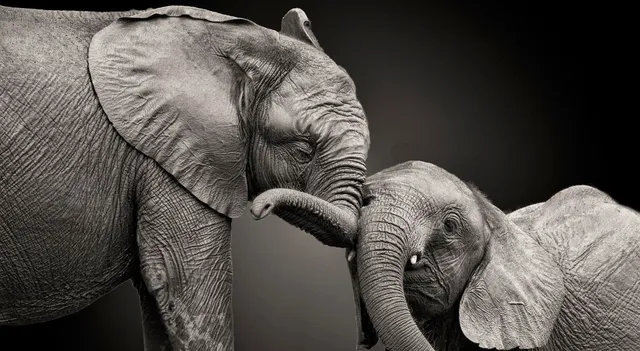- By Ridam Sharma
- Tue, 12 Aug 2025 11:26 AM (IST)
- Source:JND
Lesser-Known Facts About Elephants: World Elephant Day is celebrated each year on August 12. A day serves as a tribute and an awareness for these gentle giants who have walked our earth for millions of years. Elephants are loved across the globe for their unique appearance, intelligence, strong social relationships, and key importance for keeping ecosystems healthy. The special is a reminder that elephants are much more than their size. Other than their tusks and trunks, they have thousands of characteristics, habits, and adaptations that only a few people know about. Regarding the objective of the special day, here is a list of more than 30 lesser-known but most fascinating facts about elephants, according to ElephantConservation.org.
List Of 30+ Lesser-Known Facts About Elephants:
1. Elephants are the only mammals that cannot jump. Their huge legs do not let them jump.
2. Their skin is very thick, approximately 2.5 cm. However, highly sensitive, which means the thickness of their skin does not stop them from feeling a fly sitting on them.
3. Wrinkled skin retains water and keeps them cool, and they are highly suited to a hot environment.
4. Elephant tusks are long incisor teeth that continue to grow all their lives, similar to human fingernails.
5. Only males among Asian elephants possess large tusks. Female Asian elephants have small Tushes that hardly extend beyond their lip line.
6. The tusks of each elephant are distinct, just like human fingerprints.
7. Elephants possess 26 teeth altogether, having 6 sets of molars in the course of their lifespan; they get replaced as they deteriorate.
Lesser-Known Facts About Elephants' Senses
8. Elephants can detect water from 12 miles away by smell. Their sense of smell is one of the most sensitive in the animal world.
9. Their trunk is very versatile and can detect even the smallest of objects, from peanuts to sense temperature and any form.
10. An elephant's trunk can store over 8 litres of water at one time and is employed to pour water into the mouth, not as a straw.
11. Elephants are born swimmers and employ their trunk as a snorkel when swimming across deep water.
12. Elephants are known for their tremendous size, but they move almost silently. All thanks to padded feet that reduce noise to a minimum.
Lesser-Known Facts About Elephants' Communication And Intelligence
13. Elephants purr like cats to make contact. They can also produce low-frequency noises that travel miles for communication over great distances.
14. They talk with sounds, contact, and seismic vibrations through the ground.
15. Elephants possess the ability to recognise themselves in mirrors, displaying high self-recognition common among only a few animals.
16. Studies indicate elephants might give names to individuals and have special vocal designations to address certain people.
17. Their memory is mythical, and their matriarchs retain migration paths and water sources for decades. Elephants are also regarded as one of the most intelligent animals.
Lesser-Known Facts About Elephants' Social And Behavioural Trivia
18. Elephants occupy matriarchal herds under a leading older female; males tend to leave the herd at adolescence.
19. Female elephants herald new births with a trumpet; whole herds assist newborns.
20. Baby elephants can stand up after 20 minutes and walk within an hour of birth.
21. Elephant babies do not have control over their trunks for many months, and they learn by copying or following their elders.
22. Calves will drink their mother's milk for up to 10 years.
23. Young elephants are nurtured by all the females of the herd, not only by their mother.
Also Read: Adorable Baby Elephant’s Attempt At Sitting On Chair Leaves Internet Gushing, Netizens Call It Smart
Lesser-Known Facts About Elephants' Reproduction and Lifespan
24. Elephants experience the longest pregnancy of any mammal—22 months on average.
25. Elephant calves at birth weigh as much as 300 lbs (136 kg).
26. Females are pregnant every 4–5 years, and they may have up to 12 calves in their lifetime.
27. Their life span is 70 years in the wild.
Lesser-Known Facts About Elephants' Ecology And Impact
30. Elephants eat and drink 220 lbs (100 kg) of food and drink 50 gallons (210 litres) of water every day.
31. One elephant may produce one ton of dung per week, which spreads seeds and aids in fertilising the soil.
32. Elephants are also known as the Ecosystem Engineers because they influence whole ecosystems by constructing waterholes, pathways, and spreading seeds.
33. Some elephants dig for salt in subterranean caves with their tusks in Kenya's Mount Elgon National Park.
Additional Lesser-Known Facts About Elephants:
34. Elephants spend 2–3 hours sleeping and 16 hours a day foraging.
35. Ears of African elephants are shaped like Africa. While, ears of Asian elephants are differently shaped and smaller.
36. Elephants use mud and dust as a sunscreen to protect their skin against sunburn, as they have sensitive skin.
Also Read: 30+ Lesser-Known Facts About Lions
37. Elephants, along with humans, are the only mammals with chins.
38. Elephants’ pulse rate is approximately 27 beats per minute, which is notably slow for their size.
39. Their brains are the largest of any land animal and weigh more than 5 kg (11 lbs).
40. Elephants are warm-blooded and suckle their young with milk, which is an unusual mammal characteristic.
World Elephant Day is not just a celebration of elephants but a firm reminder of our responsibility to conserve them. Challenges like habitat destruction, poaching, and human-wildlife conflict endanger these unique animals. These ecosystem engineers need our protection and intervention. Therefore, on this World Elephant Day, let's promise a free, secure, and flourishing future for elephants across the globe.

